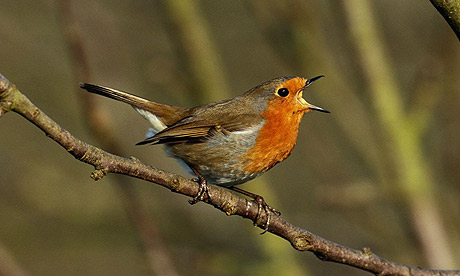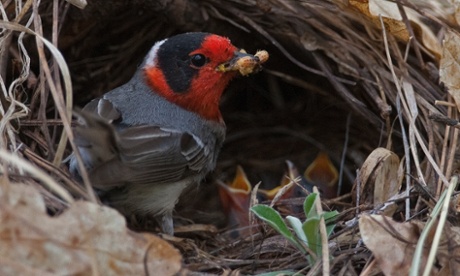Songbirds in cities are damaging their health, exposing themselves to predators and weakening their gene pool by trying to be heard above the din of urban life.
New research shows that male birds trying to compete with traffic and city sounds are singing louder and at increasingly higher frequencies, which could harm their vocal cords and hearing. As a result their songs are becoming more chaotic and less diverse, which makes them less attractive to female birds and damages their mating opportunities. Some birds, including robins, are choosing to sing at night instead of during the day. This not only makes them more vulnerable to attack but, because the birds need to be awake in daylight hours to feed, creates stress and exhaustion.
'The difference between urban and rural birdsong is becoming so great that the two groups could now be unable to communicate, leading to inbreeding and a weakened gene pool,' said Dr Sue Anne Zollinger, of the University of St Andrews, who has studied the impact of environmental noise on birds' song learning and development. A group sharing a small gene pool, said Zollinger, was less likely to be able to adapt quickly to new diseases or environmental pressures, putting them at risk of being wiped out.
Birds sing to warn of danger, attract a mate and mark out their territory. Another study of the dawn chorus of nightingales found that birds in Berlin sang up to 14 decibels louder than their counterparts in the forest. The highest volume occurred on weekday mornings. A further group found that great tits in European cities sang at a higher frequency than birds in the country, so that they could be heard above the rumble of cars, lorries and industry.
'By trying to sing over the sound of the city, birds are risking vocal injury because they're using more pressure to sing loudly, while also singing at higher frequencies to try to counteract the low rumble of traffic noise,' said Zollinger. 'All this effort puts the same strain on a bird's vocal cords as when a human tries to shout to be heard in a noisy pub - except the birds are doing it all day, every day,' she said. Singing under such pressure means birds have less control over the sound they produce. 'Their songs may lose quality and become more rough-sounding,' said Zollinger. 'This could have serious implications on how fit and attractive they're perceived to be by females. Even when they manage to mate, however, their female offspring will prefer males who sing in the same lower-quality way, which will eventually lead to complete isolation between different groups and inbreeding.'
Henrik Brumm, from the Max Planck Institute for Ornithology in Germany, agreed. 'This is a hot topic and one we are only just beginning to understand,' he said. 'There are many different strategies that birds deploy to counter the noise of the urban environment. These strategies could lead to us seeing a completely separate urban species of bird which can't breed with its country cousin.' He feared some birds might not be flexible enough to cope with urban clamour. Research has linked noise pollution to a drop in the number of orioles, cuckoos, great reed warblers and house sparrows.
Andre Farrar, spokesman for the Royal Society for the Protection of Birds, said the birds most at risk of genetic separation are those most talented at adapting their song: starlings, song thrushes, nightingales, robins and marsh warblers. 'Birds with richer and more complex songs do better in the mating game and are able to defend their territory more successfully,' he said. 'If birds start simplifying their songs so they can be heard against background noise, they might find themselves attacked by other birds who think they're sick. This could have serious implications for conservation.'
Mark Constantine, author of The Sound Approach to Birding and founder of the Sound Approach database, the fourth-largest natural sound archive in the world, said: 'Birdsong is used as an indicator of quality of life and has been proved to reduce our blood pressure. When we live in the centre of large, urban areas, we get more stressed and it's extremely good to have birdsong around us. The impact on humans of birdsong is massive. It harms us, as well as the birds, if their songs become simpler, shriller and louder.'





